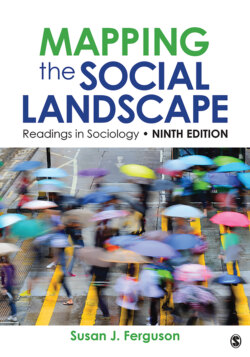Читать книгу Mapping the Social Landscape - Группа авторов - Страница 38
На сайте Литреса книга снята с продажи.
Reading 7 Finding Out How The Social World Works
ОглавлениеMichael Schwalbe
Most sociologists agree that the best way to learn about research is through hands-on experience gained by conducting a study. The research process, examined in the next three readings, often turns up new questions and challenges for the researcher. The first reading is by Michael Schwalbe, a professor of sociology at North Carolina State University, and is excerpted from his 1998 book, The Sociologically Examined Life: Pieces of the Conversation. In this selection, Schwalbe explains the advantages of utilizing systematic research to study the social world. Schwalbe also summarizes the kinds of questions sociologists often ask and argues that it is important to be “sociologically mindful” whenever addressing social research.
Without looking up any statistics, can you say whether there are more poor black people or poor white people in the United States? A common mistake, because blacks are often represented as being poor, is to say that there are more poor black people than poor white people. But blacks make up only about 12 percent of the U.S. population. And even though the rate of poverty is higher among blacks (about 30 percent) than among whites (about 15 percent), there are so many more white people in the United States that whites still make up the majority of those living in poverty…. A few facts and a bit of logic make this easy to figure out.
Source: Michael Schwalbe, “Finding Out How the Social World Works” from The Sociologically Examined Life: Pieces of the Conversation. Copyright © 1998 by Michael Schwalbe. Reprinted with the permission of the author.
So logical deduction is one way to know things, or to find out the implications of what we know. Much of what we know comes straight from others. It is passed on to us by parents, teachers, friends, and so on. We can also know things from personal experience or observation, from systematic research, and from mystical revelation. It is possible, too, that some knowledge is instinctive, as, for example, when an infant “knows” that it should suck on whatever is put in its mouth.
It is interesting to think about where our knowledge comes from. What usually concerns us more, however, is how to be sure that our knowledge is valid and reliable. Each source of knowledge has limitations in these respects. Part of being sociologically mindful is being aware of these limitations.
Logical deduction, for instance, is a fine way to elaborate our knowledge—except that if our premises are wrong, then our conclusions will also be wrong; we will simply reason our way to further ignorance. One strength of logical deduction, however, is that others can check up on our assumptions and our reasoning, and thus correct us if we go astray.
Relying on what others tell us is necessary and is often a good way to learn, but how do we know that what others tell us is right? Surely you have had the experience of being told—by a parent, teacher, or mentor—something that later turned out to be wrong. Then there is the problem of deciding between different versions of the truth that come to us from sources that seem equally credible. How do we decide who is right?
Personal experience and observation are good sources of knowledge, except that it is easy to misjudge and overgeneralize from these sources. For example, your own observations might tell you that the sun revolves around the earth, or that all Lithuanians are slobs because both of the Lithuanians you’ve met in your life were a bit slobby, or that there is no ruling class in the United States because you’ve never seen it gathered in one place, or that crime is rising because you were just robbed. The problem in each case is not that you don’t know what you’ve seen, but that what you’ve seen isn’t enough to support the conclusion you reached….
